Far from just incorporating another health-and-safety buzzword, the best ergonomic keyboard is the one that actually delivers on its promises. But it's slightly more than just being comfortable to use – some of the best keyboards this side of £300 might initially be comfy, but end up being not very ergonomic. So, just what is an ergonomic keyboard?
Put simply, the best ergonomic keyboard is designed to fit around your physical needs – not the other way around. By aligning the keys (or even the whole board) a certain way, it puts it more in line with what your body naturally positions itself as, therefore reducing strain. You'll have no doubt noticed after prolonged sessions in front of a computer, your wrist starts to hurt, the tendons in the back of your hand start to feel strained and before you know it, you're fighting bad ergonomics just to write coherently. But that's all about to change.
Best ergonomic keyboard of 2025 at a glance:
• Best overall: Logitech Wave – View at Amazon
• Best budget: Arteck Universal Wave Keyboard – View at Amazon
• Best build: Keychron Q8 Alice – View at Amazon
• Best split-layout: KINESIS Freestyle2 – View at Amazon
As with all things ergonomic, the key is to identify your needs first. You may be a light keyboard user who is looking for basic built-in wrist or palm support. Maybe you work from home and the long hours crunched in front of your laptop from the kitchen counter made your arms feel like lead. If you're a busy writer or programmer, you may want a split-layout to touch-type on for hours on end. Someone who's used to using one of the best gaming keyboards may well want to upgrade to a customisable model with mechanical keys that are well-spaced for accuracy and comfort. Whatever camp you're in, the main goal of every ergonomic keyboard is to be comfortable, easy to use and as free from strain or fatigue as possible.
We've put together a guide at the end of the article to help you discover the right type of ergonomic keyboard to suit you. And, of course, our experts have trawled the ocean of keyboards out there, avoided shoals of uncomfortable pretenders, and reeled in the best ergonomic keyboard models for you. Let's dive in.
All prices are correct at the time of writing. Prices, stock and deals are subject to change without notice.
The best ergonomic keyboards of 2025
Best overall
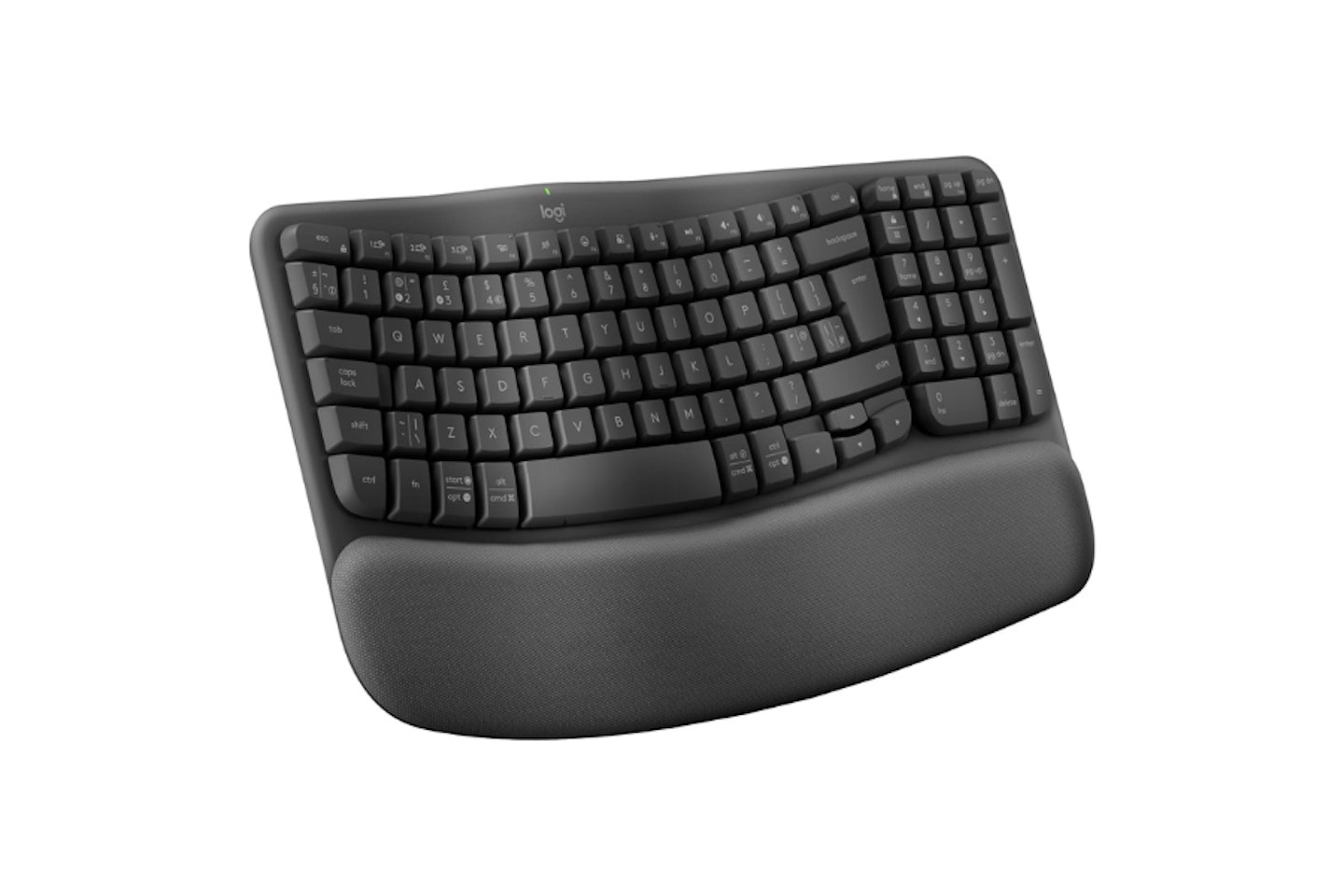 Logitech
LogitechFor optimal comfort, the Logitech Wave Keys is a phenomenally well-designed keyboard at a great price, leaving no stone unturned to bring users the best typing experience possible. A great cheap keyboard that doesn't pull its punches with quality.
The subtle wave aesthetic of the Logitech Wave keyboard and its tasteful grey palm rest looks simply fantastic and its cushioned keys are brilliantly responsive, giving quick typists a new lease on life. The Logitech Waves Keys keyboard also isn't completely radical in its design, there are no split keys or external devices, so it's easy to pick up and feels more natural than a regular keyboard.
Those who typically use mechanical keyboards may find the feel of the Logitech Wave Keys to be a little squishy or unresponsive compared to what they're used to, which may detract the experience for users who prefer a snap to their typing. For most, however, this cushioned, quiet typing feel is a breath of fresh air and only boosts the sheer comfortability of the keyboard itself, and makes it perfect to bring into the office.
Pros
- Gorgeously designed layout
- Contoured for perfect ergonomic comfort
- Cushioned palm rest reduces carpal tunnel pain
Cons
- Some users dislike the feeling of the cushioned keys
| Size: | 375.9 x 218.9 x 30.5 mm |
| Connectivity: | USB-A receiver, Bluetooth |
| Backlighting: | N/A |
| Switches: | Membrane |
| Battery: | Up to three years |
Best budget
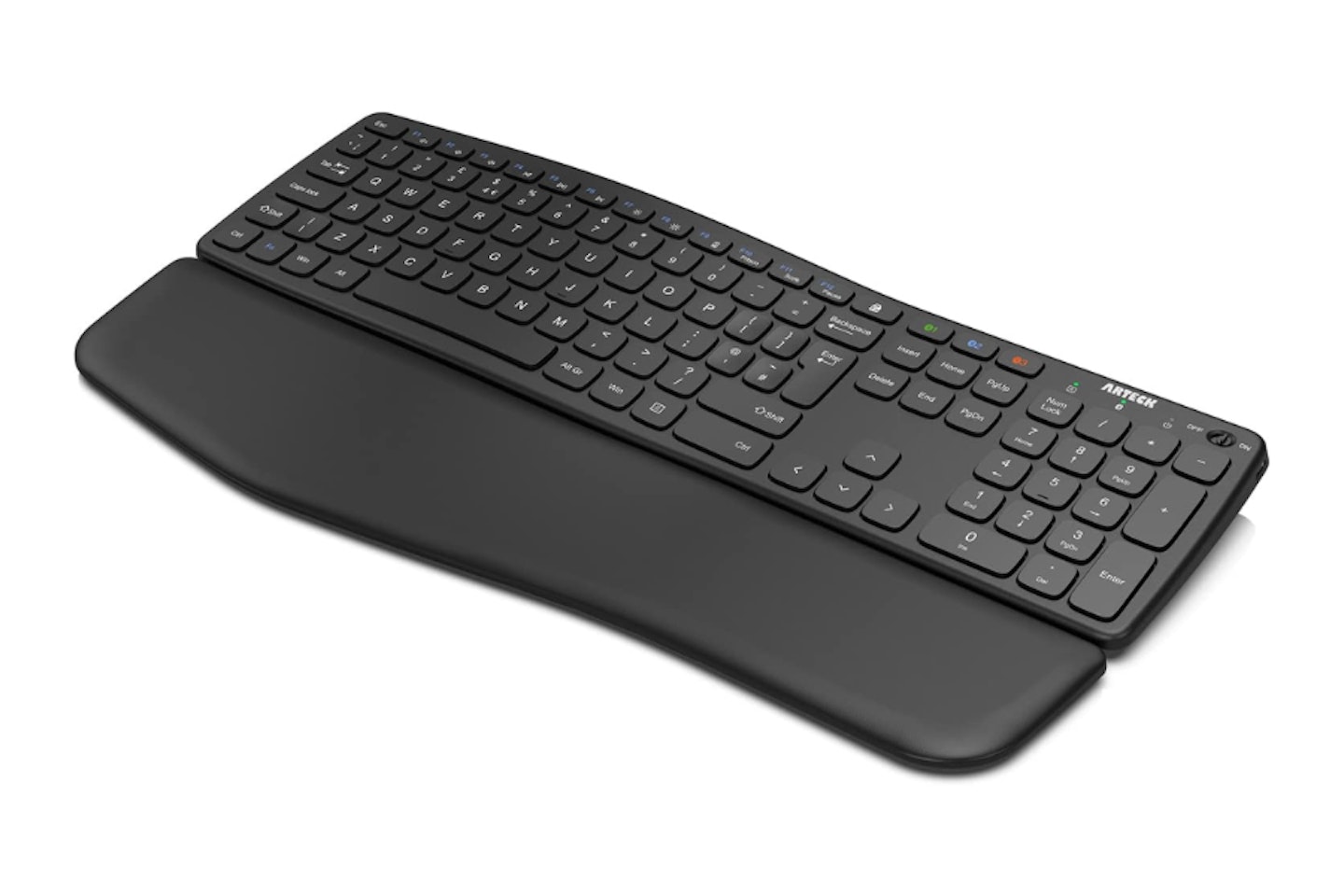 Arteck
ArteckWe had to do a double-take when we saw the design, spec and overall ergonomic feature set of the Artek Universal Wave keyboard.
At first look, this appears to be a standard key layout, and it is – but there's a vertical curve/wave to the board. This promotes a healthy wrist and palm position.
And talking of the wrists, there's a fantastic removable magnetic palm/wrist rest to make the wave and tilt of the keyboard even more ergonomic to use. One brilliant added extra is the fact that this can connect to three devices. Granted, there is no wifi here, but being able to press a button and switch the keyboard between those devices is a godsend for multitaskers.
The low-profile keys are great for getting to grips with, though the membrane actuation can feel rather "mushy" to type on. Though for such a well-priced budget option, this nails all the things it should.
Pros
- Vertical curve/wave design is ideal for those who like a standard layout plus ergonomic angles
- Removable magnetic palm/wrist rest for good comfort options
- Can connect to three systems simultaneously
Cons
- No Wi-Fi connectivity
| Size: | 419.1 x 127 x 10.2 mm |
| Connectivity: | Bluetooth, up to three devices |
| Backlighting | N/A |
| Switches: | Low profile scissor-switch and membrane |
| Battery: | Rechargeable via USB C, six-month charge |
Best built
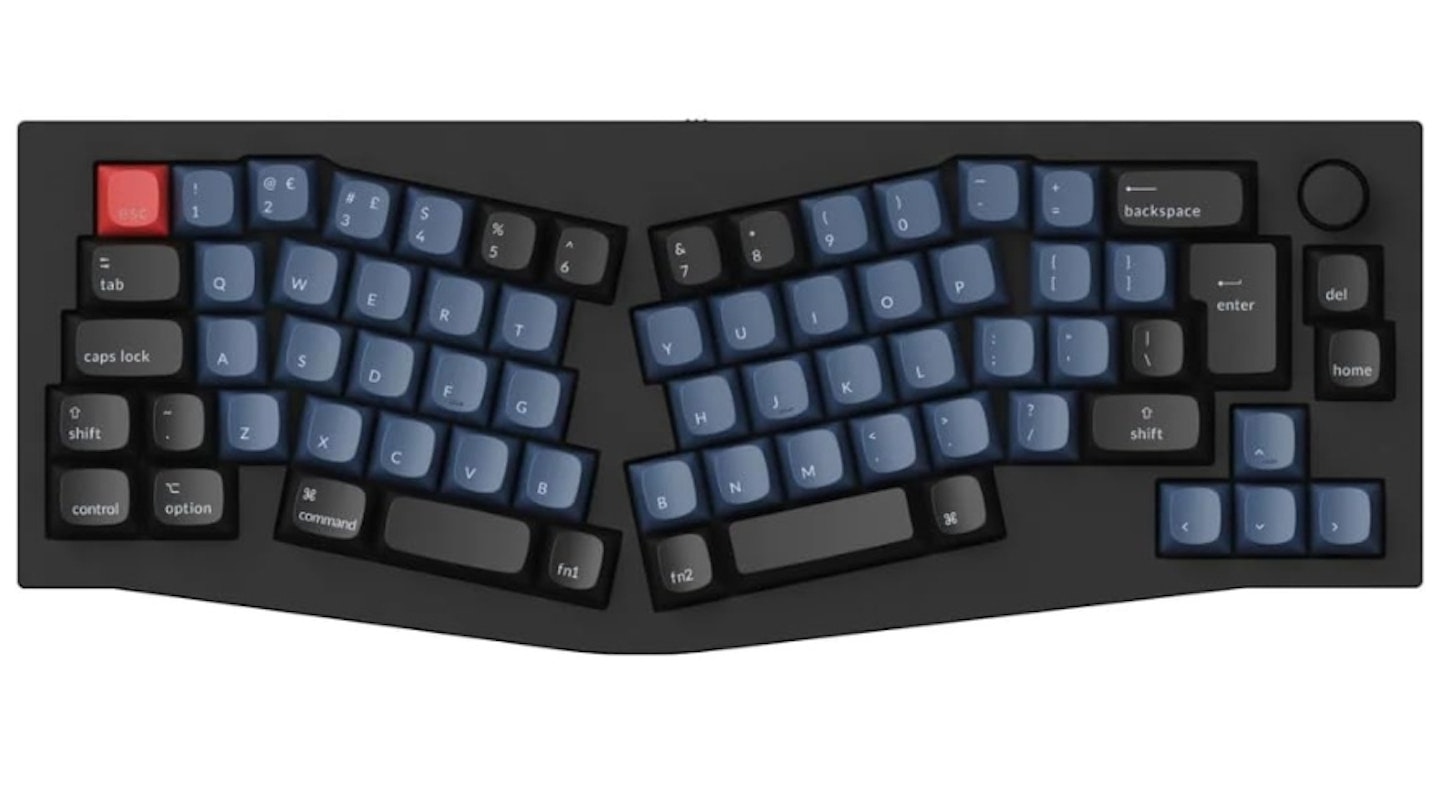 Microsoft
Microsoft This all-metal Alice keyboard is perfect to bring a touch of high-end to your set-up. Keychron are well-regarded in the mechanical keyboard scene, and that translates over to their take on the Alice layout. Offering full-sized mechanical switches (either linear or tactile) you can be sure your key travel will have minimal resistance, just like your reach.
Though it is only able to connect with USB-C, you won't be needing to take this anywhere with you. The all-aluminium construction is sure to give you a weighty and satisfying typing experience. However, despite the price there isn't an option for wrist rests, and the height of the keyboard may become tiresome on the wrists after prolonged use.
Though it is edging towards the higher-end of ergonomic keyboards, you canbe sure this fits both style and substance.
Pros
- Split keyset design is great for posture
- Mechanical switches give more of a satisfying, accurate key actuation
- Pre-lubed switches for ultimate comfort
Cons
- No wrist rest
| Size: | 360 x 140 x 40 mm |
| Connectivity: | USB-C Wired |
| Backlighting: | Yes, RGB |
| Switches: | Red or Brown, hotswappable |
| Battery: | N/A |
Best split layout
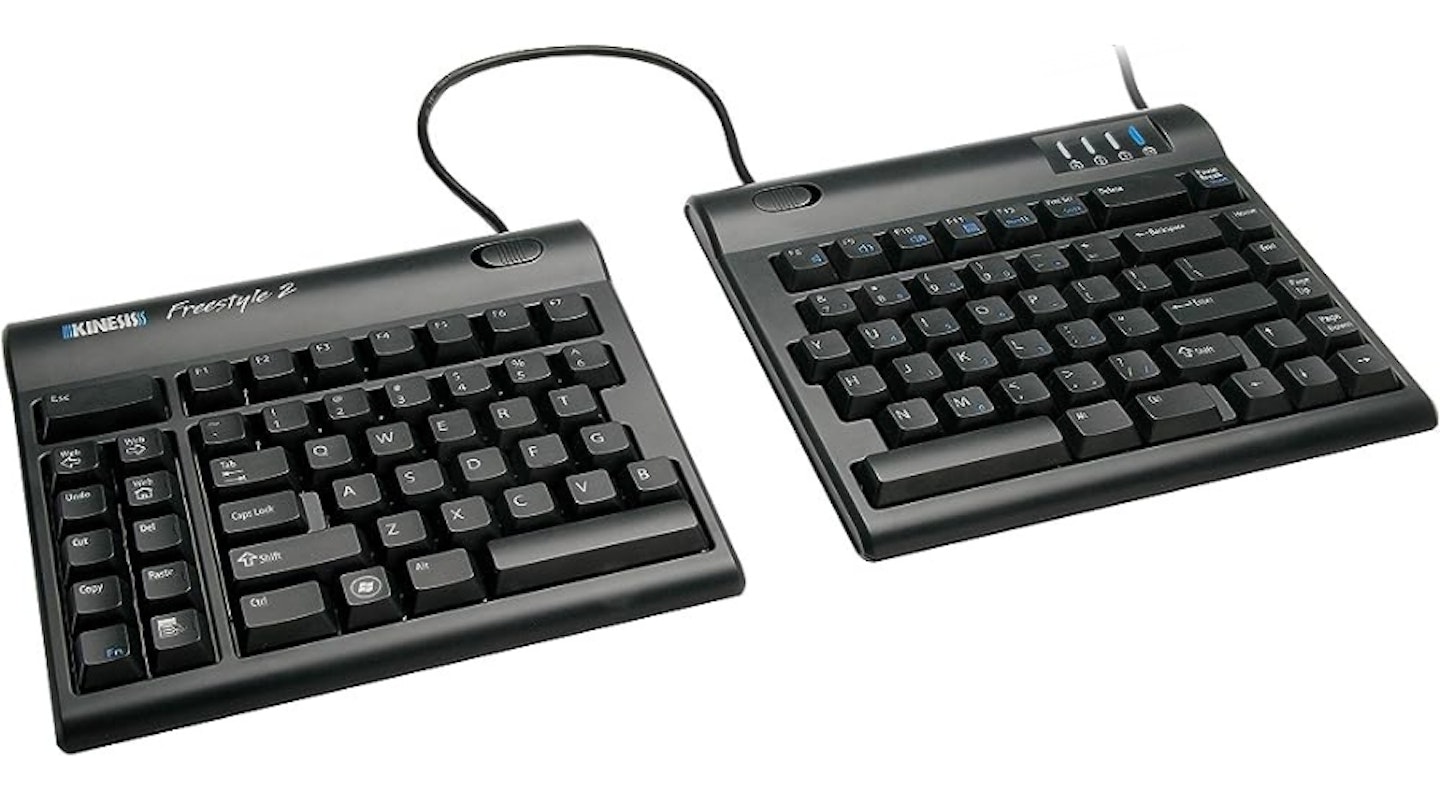 Logitech
LogitechOne of the more "out there" keyboards in terms of design, the Kinesis Freestyle2 combines amny of the features of a traditional office keyboard, but heightens it wit added ergonomic features. Every keyboard on the list until now has been fixed, meaning that the keyboard is in one part. The Freestyle2 allows you to split your typing surface, allowing for better posture and a more comfortable typing experience, once you get used to it.
That is the caveat with split keyboards, that with greater efficiency comes a greater learning curve. It may take some time, but since theis keyboard can even coonnect to work as a standard layout keyboard, means that even if you struggle with the full ergonomic layout you can return to something more familiar.
Kinesis are regarded as the kings of ergonomic keyboards, so if this one isn't for you keep reading and you may find another Kinesis keyboard that suits your style.
Pros
- Incredible array of ergonomic features
- Combination of split key layout and vertical curve for extra comfort
- Able to be used as a regular keyboard if needed
Cons
- A small learning curve for those who haven't used curved or split keyboards
| Size: | 482.6 x 317.5 x 88.9 cm |
| Connectivity: | USB-C |
| Backlighting: | N/A |
| Switches: | Low-force membrane switches |
| Battery: | N/A |
Best wireless
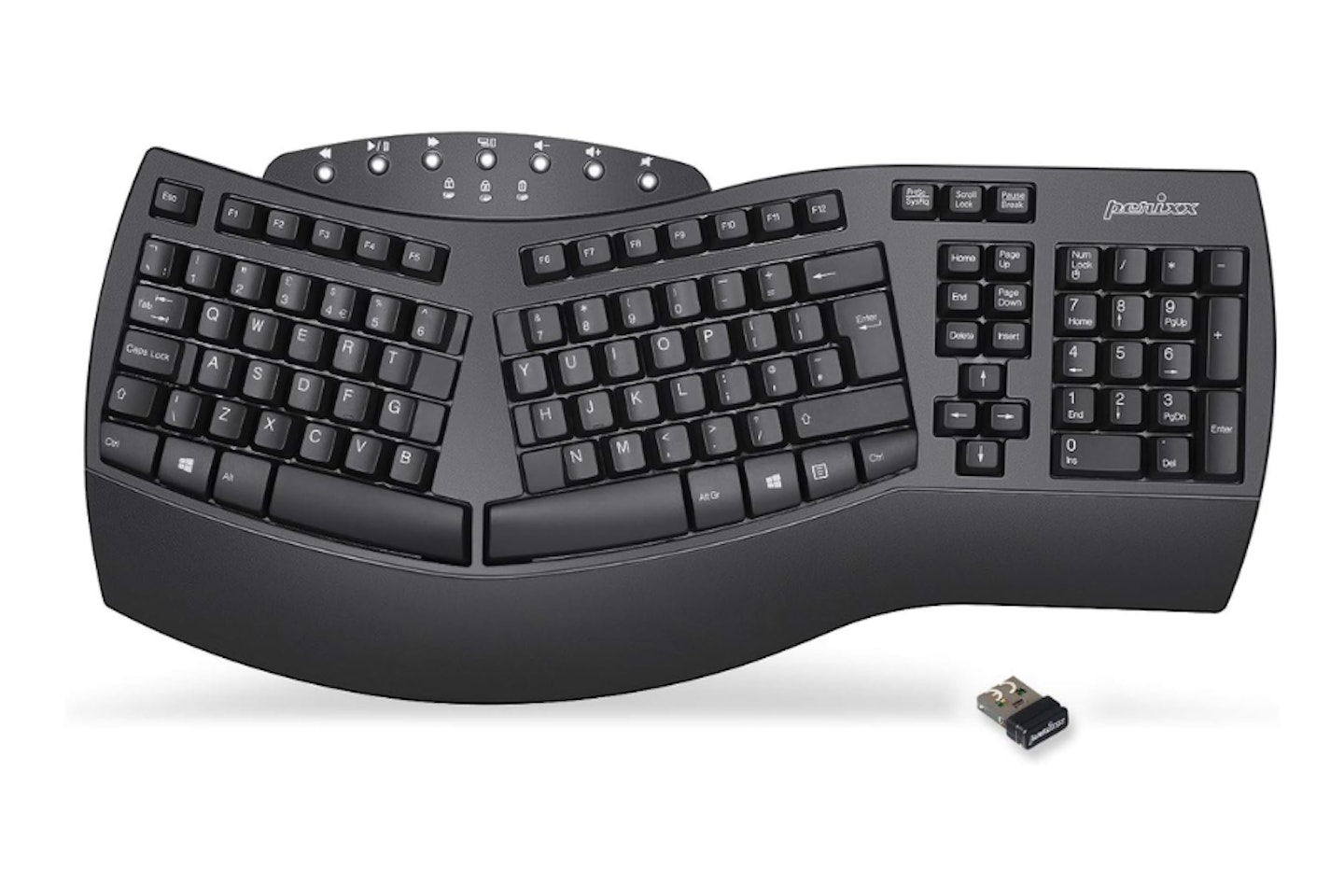 Perixx
PerixxDespite being not the only fixed split keyboard here, the Perixx PERIBOARD-612 ticks an awful lot of boxes for both affordability, portability and all-around ergonomics. One unexpected feature at this price point is the dual Bluetooth and WiFi connectivity.
This means you can pair this with a wide range of devices - including a tablet if you're looking to take your favourite keyboard away with you. It isn't a silent or dampened keyboard, especially in the sub-£100 category, but if you're not bothered by a little keystroke noise this is fine.
In terms of ergonomics, you get a full-size keyboard - which means much less of a learning curve if you're new to these kinds of keyboards - but also the split layout that many people love. There's also a slight upward curve, or contour, to this one - so the angle of your palms when typing is more akin to your natural position.
Pros
- Flexible USB and Bluetooth connectivity
- PC and Mac compatible
- Comfortable split layout
Cons
- Some may prefer a quieter typing experience
| Size: | 485 x 236 x 44 mm |
| Connectivity: | Wireless 2.4 GHz, Bluetooth. |
| Backlighting: | N/A |
| Switches: | Membrane, Tactile Responsive Keys with long travel distance |
| Battery: | AAA-powered, life not specified |
Best Alice layout
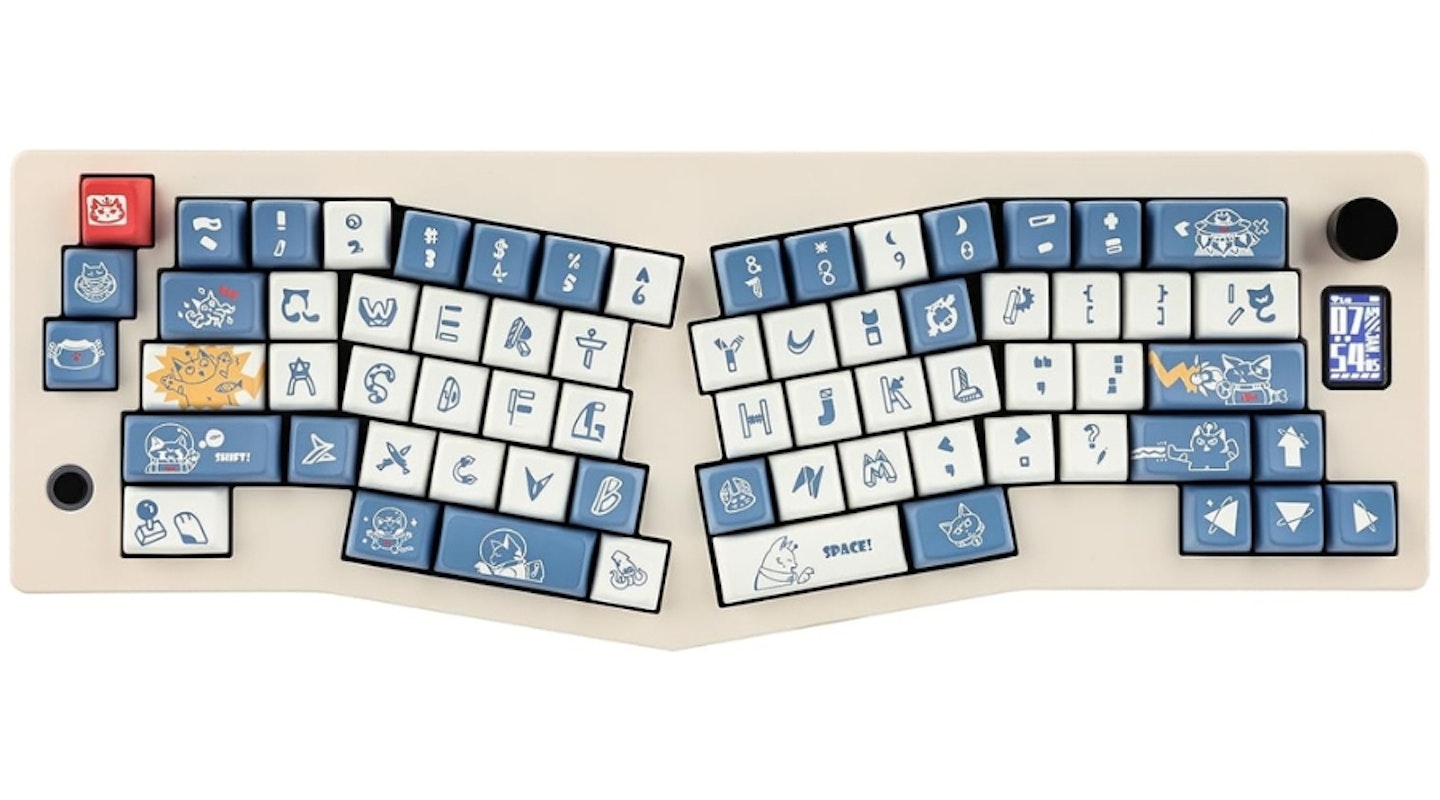 Microsoft
MicrosoftThe Alice layout is uncommon across many keyboard users, but it can act as a handy in-between for those wanting to improve the ergonomics of their set-up without it ever feeling too unfamiliar. Enter Epomaker with their Cidoo AMB066.
Despite the cumbersome name, this keyboard is packed with features, not only is it hot-swappable, equipped with RGB, it comes with a configurable control knob and little LCD screen. This helps you keep track of things like the battery levels (after all this is a wireless keyboard) and adds to the overall aesthetic of the board.
But look, we can't ignore the keycaps. They're very bold, and you probably wouldn't fit in with the office aesthetic if you were caught using them. In case the urge takes you, here is a set of replacement keycaps, just fdon't forget the spacebars are different sizes, and to use the correct keys in the kit.
Overall, however, you're getting a good deal here all things considered, with all the features, cat-themed keycaps can be excused.
Pros
- Alternative layout, rather than fully-ergonomic meaning you'll adapt quicker
- Included screen and knob are extra premium features you wouldn't expect to see at this pricepoint.
- Programmable special function keys to aid productivity
Cons
- Included keycaps are very showy, and you'd likely have to replace them
| Size: | 400 x 150 x 70 mm |
| Connectivity: | Bluetooth, USB dongle, USB-C |
| Backlighting: | Yes, RGB |
| Switches: | Linear Silent Blue Switches |
| Battery: | 5000mAh |
Best mechanical
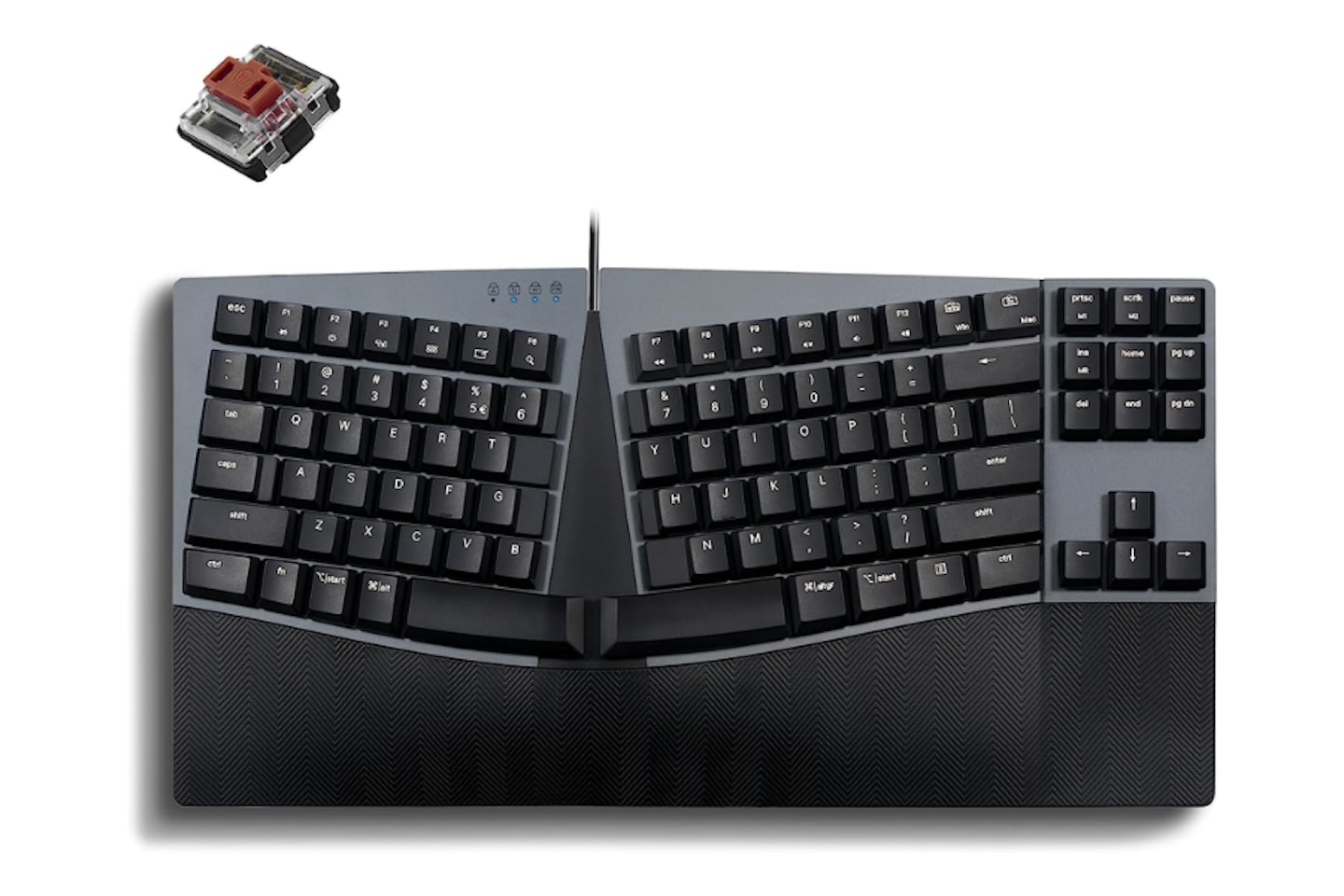 Perixx
PerixxPerixx makes it back into our line-up with this PERIBOARD 335BR – another split layout mechanical board. Before we look at what makes the mechanical option so good here, let's look at the ergonomics.
Aside from the angled split layout, this also has a 'tented' slope – more of a peak than the usual vertical curve or contour. This really does place each hand with full and even access to each bank of keys for tighter control.
And then there's the palm rest – it's integrated but tiltable, so you'll be supported while using that tented key layout. As for those mechanical keys, they're the brown ones from the much-lauded brand Kailh. They provide good key-press feedback with less-loud clicky sounds than the normal mechanical switch – so, ideal for heavy users with a distaste for excess noise or who want to work in an office environment.
Pros
- Brown tactile switches have good key-press feedback and low noise
- Tiltable integrated palm rest for extra comfort options
- Programmable macro keys for extra functionality
Cons
- No wireless connectivity
| Size: | 424 x 228 x 50 mm (L x W x H) |
| Connectivity: | Wired |
| Backlighting: | n/a |
| Switches: | Mechanical, Low-Profile Tactile Switches Kailh Brown |
| Battery: | N/A |
Best gaming
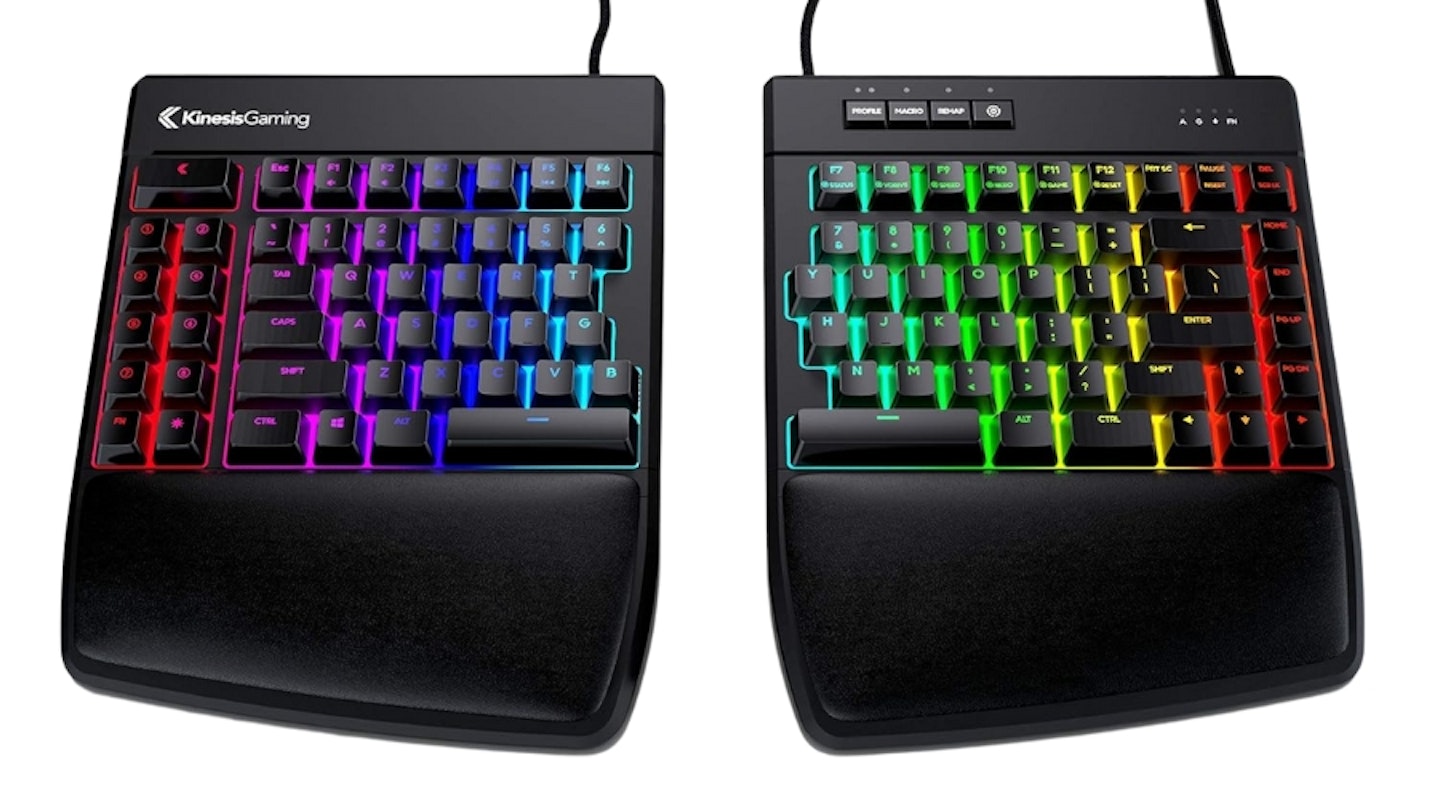 RedThunder
RedThunderThe ultimate marriage between gaming and ergonomics, and it's hard to see why this hasn't come about sooner honestly. Gamers more than anyone value spending long hours at their PC, hammering away at their keyboard in intense gaming sessions, and suffer disproportionately from issues such as repetitive strain injuries. This will help people reduce those issues whilst not detracting from the gamer aesthetic.
Costing about as much as a specced out Razer keyboard, you get far more value here from the design, RGB lighting as well as the array of macro keys to truly make your keyboard yours. Though some reviews make complaints about the build quality, overall this is a great option to help make your gaming sessions even smoother in future.
Pros
- Ergonomic design combined well with more modern gaming features
- Included soft faux leather wrist rest for flexible comfort options
- Plenty of macro keys to get your keyboard how you want it
Cons
- Reviews state that build quality is so-so
| Size: | 393.7 x 261.6 x 33 mm |
| Connectivity: | Wired |
| Backlighting: | Per-key RGB |
| Switches: | Cherry MX Brown |
| Battery: | N/A |
Best portable ergonomic keyboard
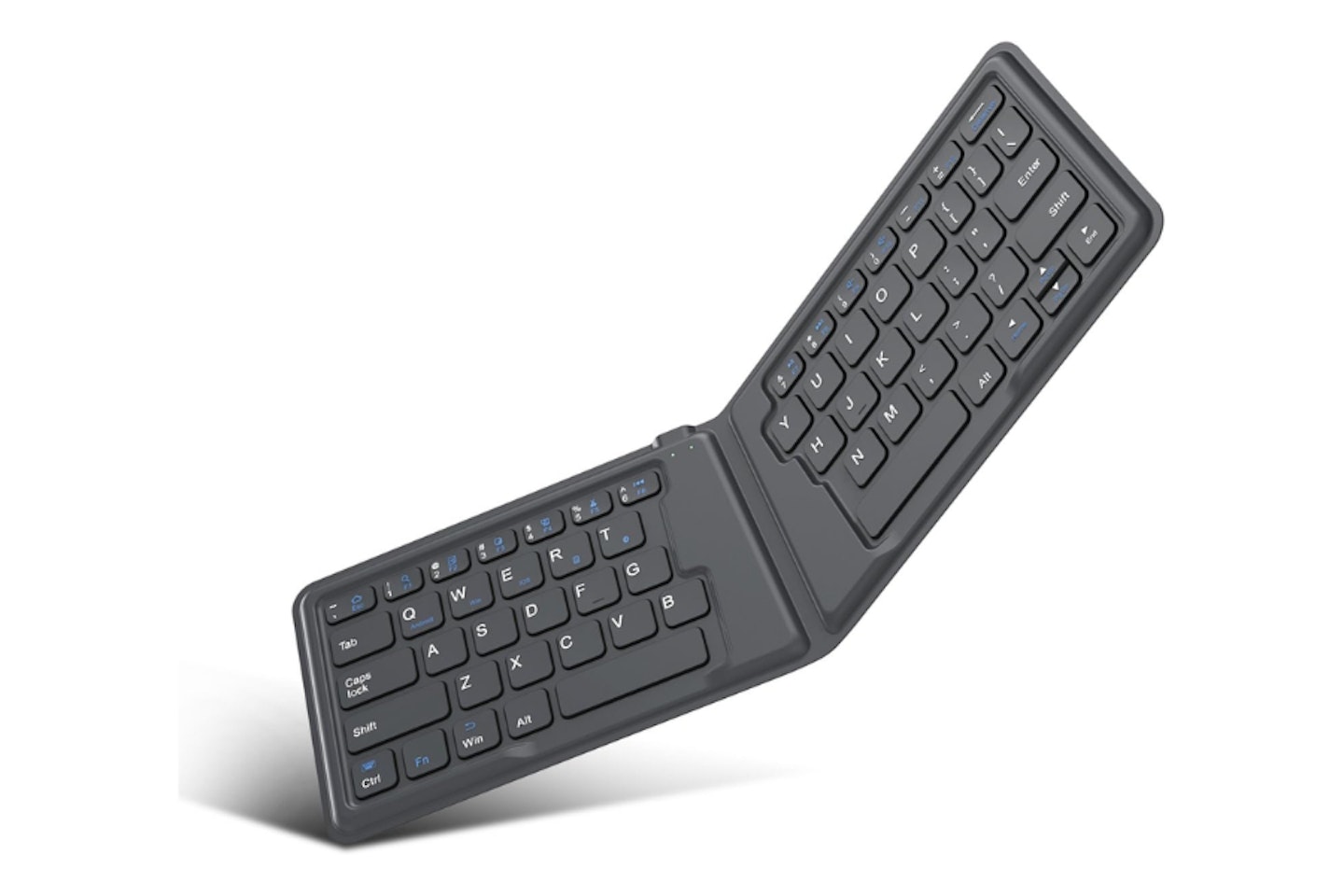 MoKo
MoKoPortable keyboards are really almost throwaway items at this point. Often bundled in with tablet cases and the like, they're often less ergonomic than typing right onto the screen, and that's largely because they're flat and compact, so anyone with hands larger than a teenager may well find themselves trying to type with their wrists and elbows tucked in. But here, MoKo has created a Universal Foldable Keyboard with one all-important feature: each segment of the keyboard is well separated and angled.
As a truly neat and portable keyboard, you won't find WiFi connectivity or wrist support, but you do get the benefit of a wider layout. It also, handily, turns on and off when opened and closed – no more drained batteries while it's packed away in your bag.
Pros
- Foldable ergonomically angled for maximum comfort on the move
- Long battery life for longer writing sessions away from home
- Pairs with a wide range of tablets, phones and more
Cons
- No wrist support
| Size: | 199 x 144 x 23.9 mm |
| Connectivity: | Bluetooth |
| Backlighting: | N/A |
| Switches: | Low profile switch and membrane |
| Battery: | Up to 60 hours |
Best high-end
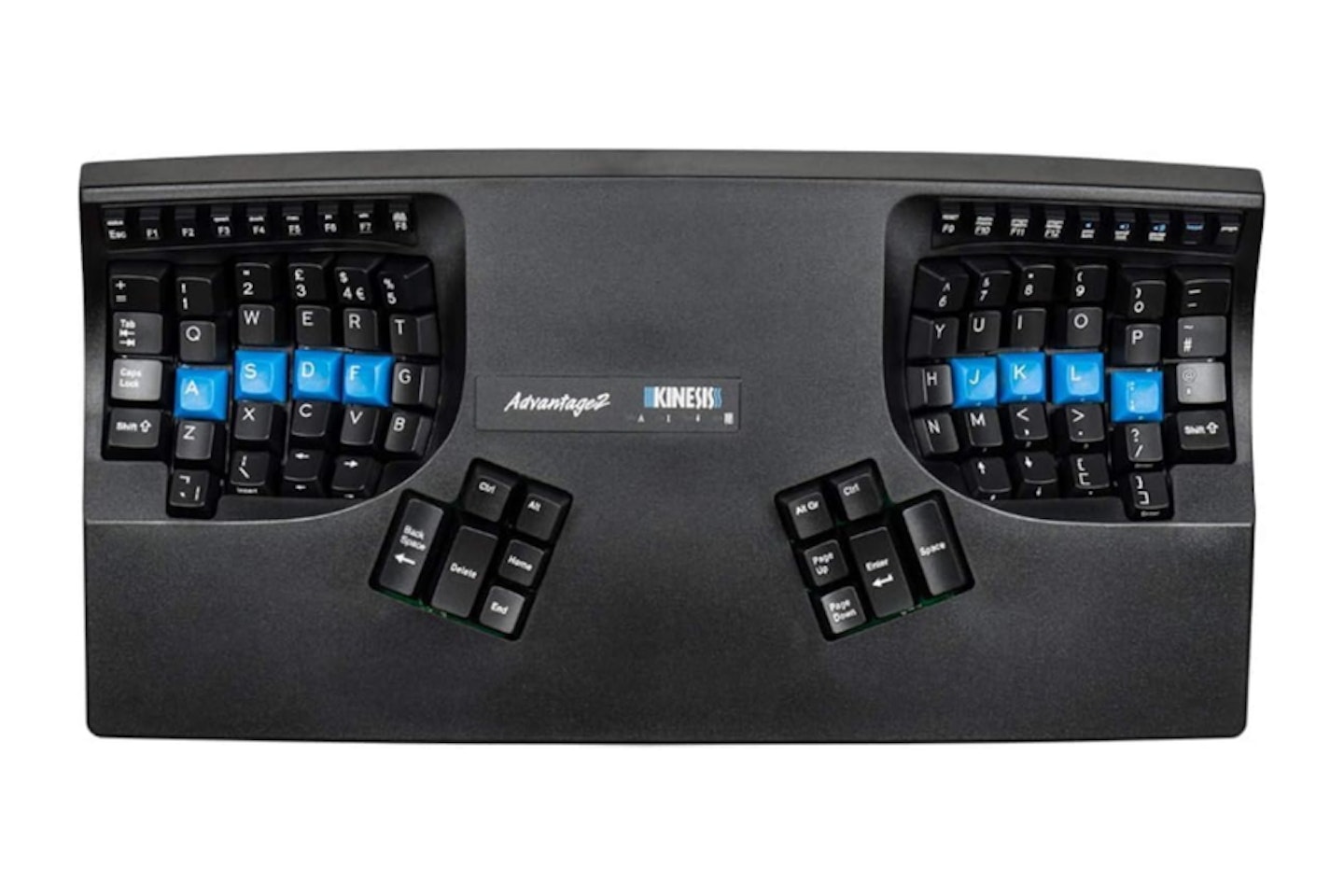 Kinesis
KinesisYes, this Kinesis Advantage2 is probably the most overkill and off-the-wall designs here, but it's getting a lot right. Loved by thousands of high-end users, this board is a tenkeyless one that, much like the other TKLs here, means you can place the mouse closer to your body, reducing painful over-reach. In addition to that, it's clear that this keyboard was made by enthusiasts, as it offers a DVORAK layout, one of the most popular alternative layouts to maximise efficiency and reducing physical stress when typing.
But the real jewel in the crown is the groundbreaking ergonomic shaping of the split keys. They're arranged in concave 'keywells' for total fingertip accessibility that again, reduces travel distance and strain. It's also the only model here that is sporting the vertical column key layout.
When paired with the keywells, the vertical orientation makes for more natural hand and finger movement. Lastly on the ergo-shape front is the 20-degree 'tented' angle – perfect, say Kinesis, for optimal comfort.
As for the switches, the ones on this model are Cherry MX Tactile key switches, so you can expect excellent sound-dampening and tactile feedback. Yes, the innovative range of design features here will take some getting used to, but if the customer feedback is to be believed, the programmability and comfort of the Advantage2 are hard to top.
Pros
- Concave key wells reduce hand and finger extension
- Keys are arranged to match the natural motion of the fingers
- 'Tented' angle of 20 degrees - optimal for comfort
Cons
- This layout will take some getting used to
| Size: | 469 x 362 x 104 mm |
| Connectivity: | Wired |
| Backlighting: | N/A |
| Switches: | Cherry MX Brown |
| Battery: | N/A |
Best ergonomic keyboard of 2025: Buyer's guide
When considering ergonomics, the benefits of the best wireless keyboards are also often overlooked. Remember, the fact that a keyboard is wireless can simplify your desktop is an ergonomic plus. By choosing wireless, you can also increase the distance between your keyboard (and mouse) and your PC - which could make for a more comfortable seating and typing position.
Ergonomic keyboard designs
But, back to keyboard comfort. Some of the most common basic types of ergonomic keyboards can be summarised by their most prominent design feature. Here's a quick guide:
Alice layout
The closest cousin of the ergonomic keyboard, whilst still being a somewhat standard keyboard. This is a specific key layout designed to reduce the reach of your fingers, and promoting a more efficient hand placement. This layout is common among people who write fast, as it reduces strain while not being too big of a departure from what they're used to.
Split keyboards
You'll also notice that some of these keyboards are literally in two pieces. That means that you have more control over the placement of each hand. Others have a split layout, but reside in one single (sometimes curved) unit: a Fixed Split keyboard. They are, however, difficult to use for non-touch typists and there's a learning curve before you'll get up to speed. However, fans of this type of keyboard all say that once they've adjusted to them, they'll never go back.
Contoured keyboards
Although many contoured keyboards share the unusual half-and-half arrangement of single-unit split keyboards, the difference here is that the keyboard has a contoured profile - a raised middle section to facilitate a more natural hand placement. This angle is often called 'tenting'.
Wave keyboards
Usually found on both contoured and non-contoured keyboards, the wave is the gently curved layout of the keys from right to left. Rather than split, these flow in a way that still creates ergonomic angles for your wrists and hands.
Vertical column layout keyboards
These are less well-known, and often listed alongside more avant-garde alternative keyboard concepts. The main feature of the vertical column layout is just that. The theory is that having the keys aligned in columns is more intuitive and a better fit for some, as opposed to the horizontally staggered standard key layout.
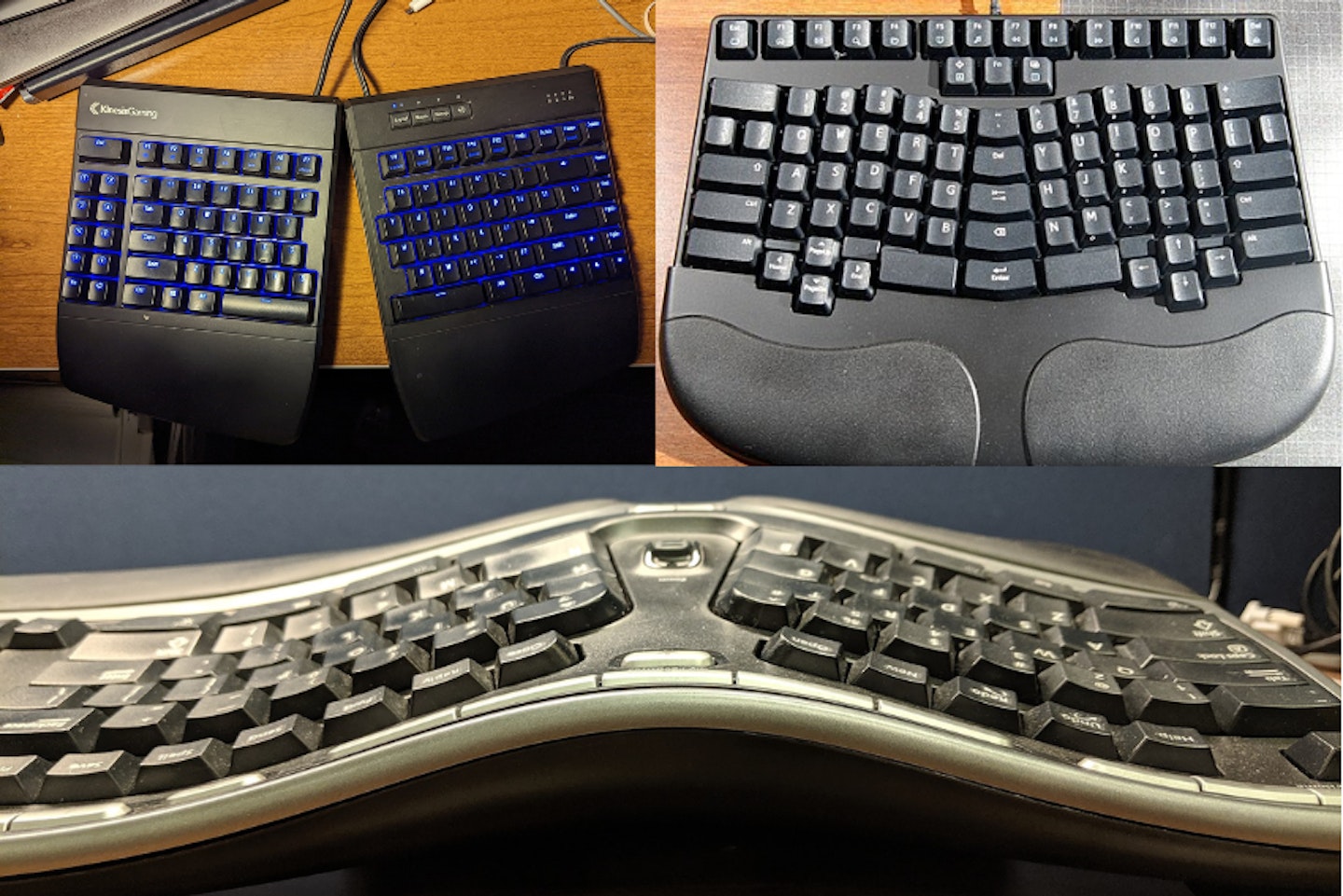
How to pick the best ergonomic keyboard
There is no hard and fast rule for this, as there’s no substitute for actually trying them out for yourself. But, let's look at narrowing down the features that will suit various kinds of users:
Writers
Many typists tend to gravitate towards split keyboards as this type really relies on being a proficient touch-typist. Also, key spacing and size (and, occasionally, lack of tactile marks) can be an issue, so do your research. The main thing here is to look after your wrist and palm comfort. If your chosen keyboard doesn't come with them, look for the best keyboard wrist rests to keep RSI at bay.
Casual users
Unfortunately for some - whether they’re light gamers or just occasional internet browsers - pain and discomfort can kick in in mere minutes. Although ergonomics is all about increased comfort and reducing strain, you don't have to be a heavy user for hours a day to suffer from RSI and the like. All of the various designs of ergonomic keyboards are of potential benefit to the casual user. The final choice is down to you and what you find most comfortable.
Gamers
A gamer is one of the most intense keyboard users out there. The control schemes vary from game to game too, so it's important to look at the keyboard layout.
If you know you prefer to use a numpad over ASDF and so on, a tenkeyless model won't be the best ergonomic choice for you. But, aside from having programmable RGB lighting and other functional customisations, gaming keyboards often use mechanical keys as they have shorter travel to activate. They're also very accurate. All of these features can work to decrease hand and wrist strain.
Designers
Creatives have a combination of needs from the categories above. They're heavy keyboard users with an eye for aesthetics and comfort. They're probably the one group here who naturally gravitate towards the most exciting and radical ergonomic keyboards available based on design alone. And that's a cautionary tale - just because a keyboard looks like it's been borrowed from an episode of Star Trek or The Expanse doesn't mean it's going to be comfortable or intuitive in the long run. So, keep your ergonomic needs simple and go with a popular design that lots of users recommend.
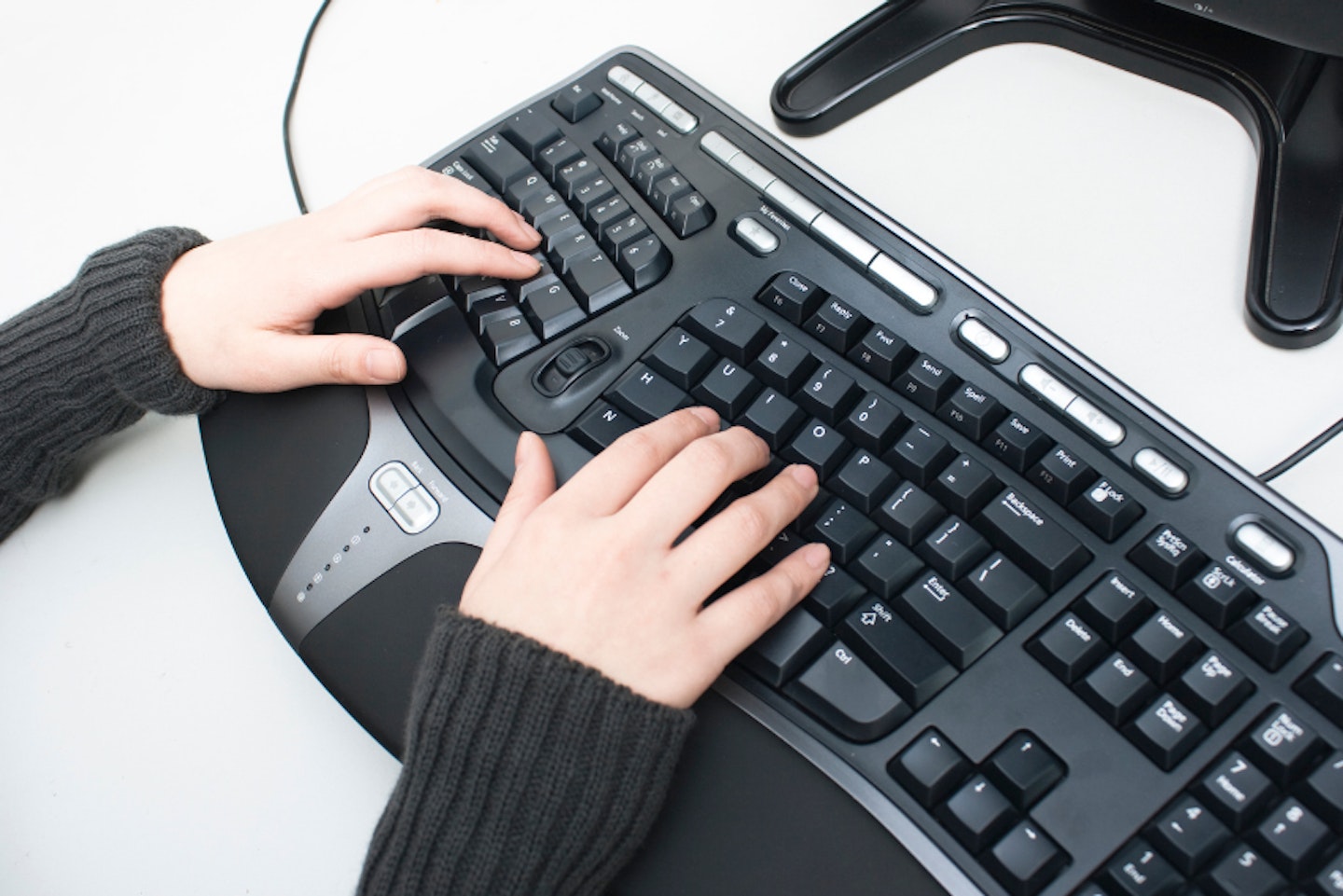
FAQs: your questions answered
Are ergonomic keyboards worth it?
Some of the best ergonomic desk setups will feature keyboards like those listed above. This is purely because anyone who takes their posture and health seriously will probably have learnt the hard way. If you've had twinges of pain or discomfort already, a change of keyboard could prevent more persistent conditions from developing. How much worth you put on this is down to you. Many lucky users just never need to consider one - but for the rest of us, there's no better option.
What's the best ergonomic keyboard for carpal tunnel?
If you suffer from any medical condition caused by repetitive strain or posture, you should consult a doctor for professional recommendations on treatment and prevention. But, if you've already gone down that path, or are familiar with your condition, you may already have an idea of which style of ergonomic keyboard is best for you. We've selected what we think are the best products to suit a wide range of users and needs. So – if you can – try before you buy to ensure the right fit for you.
Where should your keyboard be on your desk?
There's not much point in buying the best ergonomic keyboard and placing it so that it's strain to use it. As a rule of thumb, place your keyboard directly in front of your normal seating position. Your desk and chair height should work to make the bend in your arm a right angle. This means you're not overusing arm and shoulder muscles to adjust your typing position. Your wrists should ideally sit comfortably at the same level as the keys.
Why should you trust us?
At What's The Best, our mission is to provide accurate and reliable reviews, ensuring our readers receive honest and transparent information about the best technology products available. Anything less would undermine our commitment to being a trusted source of unbiased product information.
Our dedicated in-house writing team comprises experts with extensive experience and a genuine passion for technology. Collectively, we have spent decades testing and writing about tech, leveraging our expertise in all our articles, advice pieces and reviews.
We maintain complete editorial independence and do not accept payment for product reviews. Our writers have full control over their content, ensuring that products are selected based solely on the needs of our readers. While we may earn commissions or other compensation from links on our website, this never affects our product choices. These links enable us to continue offering valuable consumer advice, without compromising the integrity of our reviews.
Chris Duffill is a Senior Tech Writer and Reviewer for What's The Best. His background includes writing, editorial, marketing, design, video production and photography.
He specialises in home entertainment and audiovisual tech, including speakers, amplifiers, turntables, streaming media players, and TVs. He is also one of our resident experts in computing (PCs, tablets, smartphones, smartwatches), DSLR photography and all kinds of digital cameras. He also writes about retro gaming, game consoles and various electronic gadgets. If it plugs in, lights up or makes a noise, he’ll write about it.
Subscribe to the What's The Best Newsletter to keep up to date with more of the latest reviews and recommendations from the rest of the What’s The Best team.

